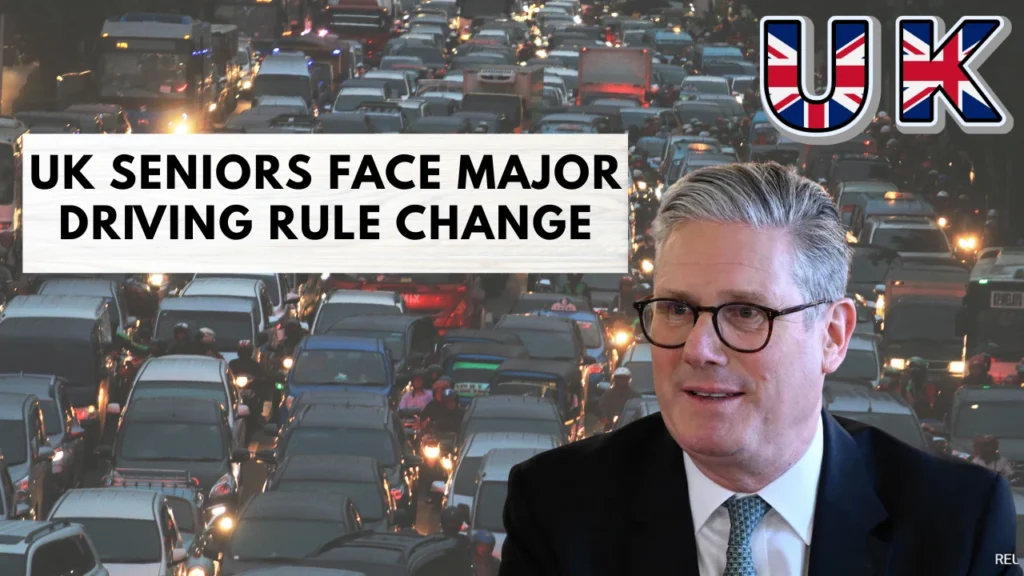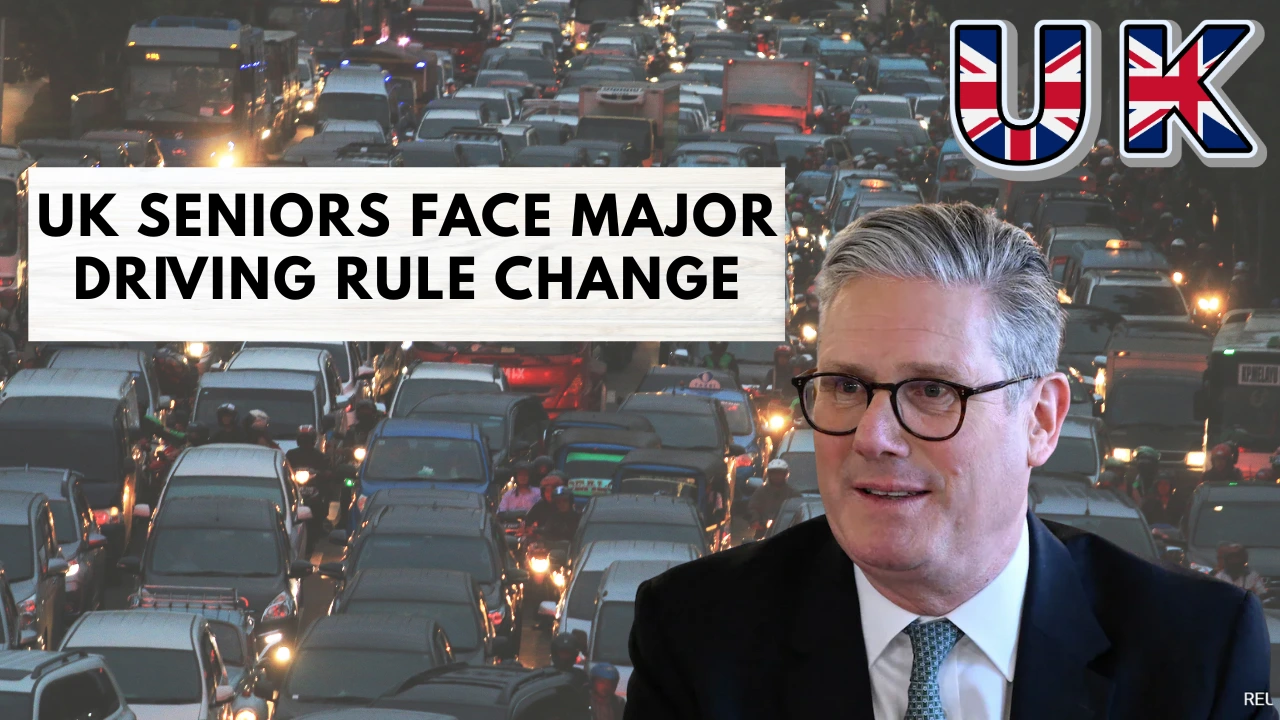UK Seniors Face Major Driving Rule Change in October 2025; As October 2025 approaches, UK drivers aged 70 and above are about to experience some of the most significant changes to licensing rules in years. These updates will no longer allow a simple self-declaration of fitness; instead, they introduce mandatory medical checks, regular vision assessments, and possibly driving evaluations.
For many older motorists and their families these new rules could have profound implications for how long they can drive, whether their licence is renewed easily, and what will be expected of them. In this article, we break down what’s changing, why the government is introducing these reforms, how to prepare, and what alternatives exist if holding a licence becomes more difficult.
UK Seniors Face Major Driving Rule Change in October 2025-Overview
| Article on | UK Seniors Face Major Driving Rule Change in October 2025; How It Could Affect Your License? |
| Effective Date | October 1, 2025 — new rules apply to all licence renewals for drivers aged 70+ |
| Medical Check | Mandatory GP or approved medical report confirming fitness to drive |
| Vision Test | Proof of eye test within the last 2 years required at renewal |
| Licence Duration | May vary (1–3 years) based on health and vision results |
| Driving Assessment | Some seniors (65+) may face short practical or hazard perception tests |
Why Are the Rules Changing?
Driving offers much more than mobility: it supports independence, social connection, and access to daily necessities like medical appointments and shopping. For older drivers, giving up that freedom can be deeply consequential. However, as people age, vision, reflexes, cognitive processing, and physical coordination can decline, sometimes asymptomatically. The UK government and road safety authorities have recognized a need to balance safety with autonomy.
What Exactly Changes in October 2025?
Here are the major shifts in the licence renewal and assessment regime for senior drivers.

1. Medical Fitness Reports Required
Under the old system, older drivers largely self-certified that they were medically fit. Under the new regime, drivers aged 70+ must submit medical reports from their general practitioner (GP) or an approved medical practitioner.
These reports must confirm that any ongoing or relevant medical conditions such as diabetes, cardiovascular ailments, neurological disorders, or vision conditions are stable and managed. Failure to disclose or certify such conditions may affect licence renewal.
2. Mandatory Vision Testing
A vital component of safe driving is good eyesight. Starting October 2025, all senior drivers must show proof of a recent eye examination (within the past two years). The test must confirm that the driver can read a standard number plate from 20 metres (or the equivalent benchmark used in UK regulations). An optometrist’s certificate or equivalent documentation will need to accompany the licence renewal application.
“These new driving rules aren’t about taking away freedom — they’re about ensuring every journey remains safe, confident, and independent for years to come.”
3. Variable Licence Term Lengths Based on Health
Instead of the previously standard renewal period (often three years for older drivers), the DVLA (Driver and Vehicle Licensing Agency) may issue shorter-term licences sometimes as brief as one year if health issues or medical conditions raise concerns. This allows for more frequent reviews when a person’s health is unstable or evolving. For those with fewer health concerns, the three-year licence term may still remain.
4. Practical Driving Assessments for Some (from Age 65+)
While this change primarily targets those aged 70+, the new rules also propose hazard perception or short practical driving assessments for drivers from age 65 upward. These are not full driving exams as such, but targeted evaluations of reaction time, hazard awareness, and general on-road decision-making under typical modern traffic conditions. They may be triggered by concerns about cognitive capacity or medical history.
Who Is Affected — and When?
- Primary group: Drivers aged 70 and above who renew their licence after October 1, 2025, will be subject to the new regime.
- Earlier checks: In certain cases, drivers aged 65 and above may also be asked to undergo the driving assessment, especially if there is a medical flag or incident history.
- Transition period: Those already holding licences may not all need immediate reapplication, but when their renewal cycle comes up after the changeover date, they must comply with the new requirements.
How Will This Affect Licence Renewal?
Here’s how the renewal experience may differ for older drivers under the new scheme:
| Step | What’s New / Additional Requirements | Implication for Drivers |
| Initiating renewal | Must obtain recent eye test certificate; arrange medical report if required | Earlier planning becomes more critical |
| Application submission | Renewal via online or postal route as before, but with additional documentation | More paperwork; possibly delays if reports not ready |
| Assessment by DVLA | Medical and vision credentials will be reviewed; in flagged cases, shorter licence or additional tests | Some may be asked for more screening or interviews |
| Licence issued | Standard 3-year term may be reduced to 1- or 2-year terms | More frequent renewals and checks |
| Non-compliance | Driving without valid licence or failing disclosure could lead to fines, suspension or revocation | Strict penalties to enforce compliance |
Final Thoughts:
The October 2025 rule changes signal a new era in how the UK manages the intersection of senior independence and road safety. For drivers aged 70 and above, the message is clear: maintaining your licence won’t just depend on past experience, but on ongoing medical, vision, and functional fitness.
FAQs for UK Seniors Face Major Driving Rule Change in October 2025
When do the new senior driving rules start?
The changes take effect from October 1, 2025.
Who do these rules apply to?
They apply to drivers aged 70 and above renewing their licences.
Do I need a medical certificate?
Yes, a GP or approved doctor must confirm your fitness to drive.
Is an eye test mandatory?
Yes, you’ll need proof of an eye test within the last 2 years.
How long will my new licence last?
Depending on your health, it may be valid for 1 to 3 years.
Could I face a driving test again?
Possibly some seniors (65+) may take a short driving or hazard awareness test.






